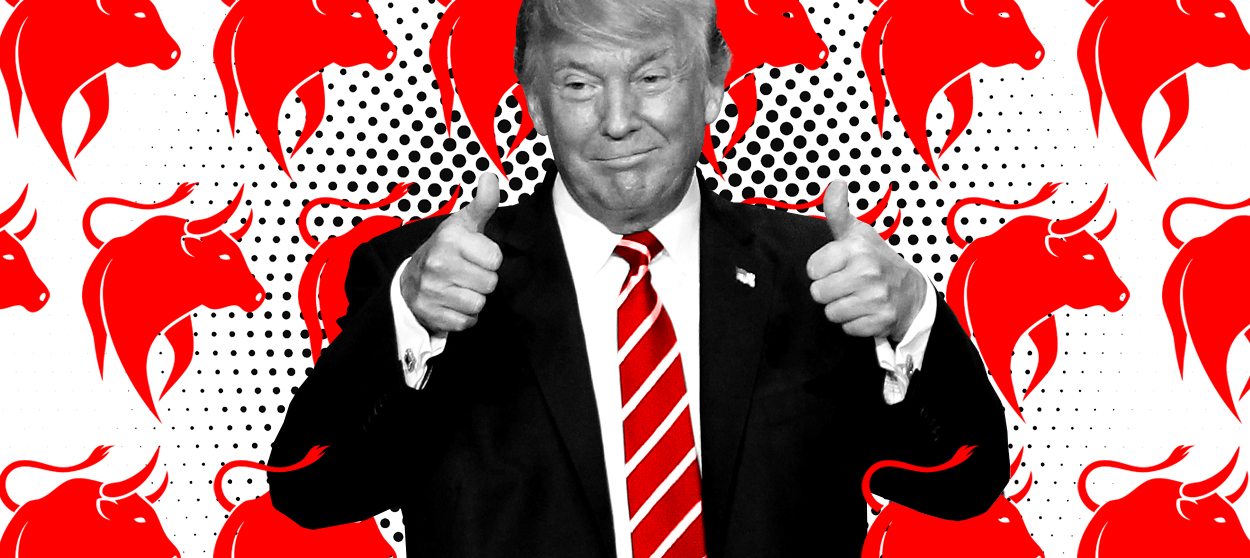How much credit does Trump deserve for the booming economy?
MAGA promised, MAGA delivered?


A free daily email with the biggest news stories of the day – and the best features from TheWeek.com
You are now subscribed
Your newsletter sign-up was successful
When a pro wrestler excels at performing those rowdy direct-to-camera promos ("I'm the king of the ring, brother, and you'll find out why at SuperSlam 2019! Woo!"), it's called being "good on the mic." Larry Kudlow is good on the mic. After last week's better-than-expected April jobs report, the director of President Trump's National Economic Council cut a video — with now more than three million YouTube views — that would make legendary screamer "Nature Boy" Ric Flair proud. "Wow!" exclaimed the energetically gesticulating Kudlow, a former CNBC host. "Low unemployment! High jobs! High wages! Big consumer confidence! Major productivity! And no inflation! It's totally awesome! We're killing it on the economy!"
Perhaps the "we" in that promo was a reference to Americans everywhere, from industrious American workers to innovative Silicon Valley entrepreneurs. Perhaps. But Kudlow was for sure also referring to the Trump White House and the administration's economic policies. Trumponomics is what's supposedly "killing it." That's the intended takeaway meant for those three million video viewers. Which is totally understandable. Politicians at all levels love to take credit for the good things that happen on their watch, deserved or not. And certainly President "I alone can fix it" Trump, who tweeted out the Kudlow video, is no exception.
But what's the reality? How much credit do Trump and his policies deserve for a continuing strong expansion that mostly occurred under his predecessor?
The Week
Escape your echo chamber. Get the facts behind the news, plus analysis from multiple perspectives.

Sign up for The Week's Free Newsletters
From our morning news briefing to a weekly Good News Newsletter, get the best of The Week delivered directly to your inbox.
From our morning news briefing to a weekly Good News Newsletter, get the best of The Week delivered directly to your inbox.
First, some perspective. The Trump economy is not startlingly different from the Obama economy, although there has been acceleration in some key areas. Job growth has been a bit slower, while growth in wages, GDP, and productivity a bit faster. And for some of that pick up, Trump's policies probably deserve credit. Economists across Wall Street have been predicting faster wage and economic growth from a combination of the Trump tax cuts and higher federal government spending juicing the economy, especially through consumers. Which is just what's been happening.
So MAGA promised, MAGA delivered? Not so fast. The point of the Trump tax cuts wasn't to temporarily stimulate the economy, but to change its longer-run growth trajectory by boosting business investment and then productivity. Trump may not have thought about it in exactly those terms, but plenty of GOP politicians and center-right economists did. And it's still too early to conclude them right or wrong. Business investment is higher than at the end of the Obama years, but hasn't been particularly impressive under Trump other than right after the 2017 tax cut, with deceleration over the past three quarters.
Productivity has indeed been higher, as Kudlow noted, and perhaps the brief bump up in business investment has played a role. Last week, the Commerce Department reported that productivity increased at a rapid 3.6 percent annualized pace during the first three months of this year. On a year-ago basis, it was the fastest pace since early 2010. As top White House economist Kevin Hassett told The Wall Street Journal, "The machines people bought last year, they are turning them on this year." And this from Capital Economic, "The acceleration in productivity growth suggests the economy's supply side is responding to the tightness of labor markets and the tax cuts introduced early last year."
Yet with business investment slowing after that initial surge, many economists doubt the sustainability of the productivity upturn and faster pace of economic growth. "Further ahead, any lasting acceleration in productivity growth will likely need to be accompanied by solid growth in business spending on labor-saving investments. Here the data is thus far inconclusive," JPMorgan economist Michael Feroli wrote in a research note. Not that a recession is nigh, but this may be as good as it gets.
A free daily email with the biggest news stories of the day – and the best features from TheWeek.com
Unless, of course, the upturn actually reflects how longer-run technological advances, such as AI, are finally working their way deeper into the economy. That would be fantastic economic news — and a lucky political turn for the president's 2020 hopes — but not something Trump's policies caused. Voters, of course, are free to believe what they want, just as wrestling fans can choose to accept or reject the staged reality of the action in the ring.
James Pethokoukis is the DeWitt Wallace Fellow at the American Enterprise Institute where he runs the AEIdeas blog. He has also written for The New York Times, National Review, Commentary, The Weekly Standard, and other places.
